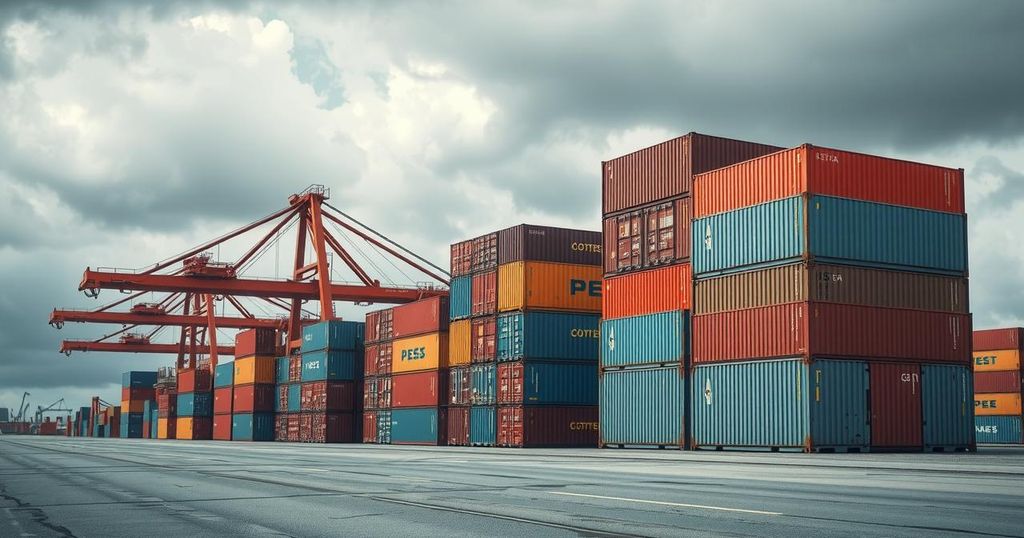President Trump authorized severe tariffs on imports from Canada and Mexico, triggering strong responses from both nations. Canada intends to impose equivalent tariffs on a substantial range of American goods, warning that such actions could harm U.S. consumers and industries. Mexico, led by President Sheinbaum, also plans measures to protect its economy. Critics argue that the tariffs will increase costs for American households, raising concerns about a potential trade conflict.
In response to President Donald Trump’s recent executive order imposing substantial tariffs of up to 25% on exports from Canada and Mexico, leaders from both countries have articulated their discontent. Canadian Prime Minister Justin Trudeau has announced equivalent tariffs on $107 billion worth of American products, emphasizing the detrimental impact on U.S. consumers and industries reliant on Canadian resources. Trudeau also highlighted that this move undermines the United States Mexico Canada agreement (USMCA) aimed at fostering fair trade.
Trudeau indicated that beginning Tuesday, Canada would impose a 25% tariff on approximately $30 billion worth of U.S. imports, which would subsequently extend to an additional $125 billion worth over three weeks. He stated that no single sector should disproportionately suffer from the U.S. tariffs, while also urging Canadians to favor domestic goods. Ontario’s Premier Doug Ford advised leveraging Canada’s significant resource advantage over the U.S. through this retaliation, especially in critical minerals and energy.
Mexican President Claudia Sheinbaum has also pledged to implement measures to protect Mexico’s interests, advocating for a cool-headed approach to the current tensions. Sheinbaum rejected Trump’s accusations of collusion between Mexico’s government and drug cartels and emphasized the need for collaboration rather than tariffs to resolve issues. She conveyed pride in Mexico’s negotiating stance and the importance of maintaining dignified discussions with other nations.
Trump’s tariffs are part of a broader accusation against Canada and Mexico regarding drug trafficking and immigration issues. Similarly, China has indicated it will lodge complaints with the World Trade Organization, asserting that the imposed tariffs violate international trade rules. The situation underscores a potential escalation of trade hostilities among key global players, which could reverberate across various economies.
While Trump argues that such tariffs are essential to safeguard American interests, critics highlight the adverse economic outcomes, including rising consumer prices and job losses. Notably, figures from the American Chamber of Commerce in Mexico caution that these tariffs could severely impact both economies. Several U.S. officials echoed concerns, stressing that the fallout from the tariffs could burden American households, affecting everyday commodities ranging from food to energy.
This article discusses the ongoing trade tensions initiated by President Donald Trump’s decision to impose tariffs on goods imported from Canada and Mexico. The tariffs, which can reach up to 25%, have triggered immediate retaliatory responses from both nations, with leaders like Justin Trudeau emphasizing the harm to U.S. consumers and critiquing the undermining of the USMCA trade agreement. This situation aligns with longstanding frustrations surrounding issues of drug trafficking and immigration sought by the Trump administration, influencing international trade dynamics.
In conclusion, President Trump’s imposition of tariffs on Canada and Mexico has prompted swift retaliatory actions by both countries, highlighting the potential ramifications on numerous sectors and consumer markets in the United States. As tensions escalate, the need for constructive dialogue and cooperation has become imperative to resolve the underlying trade disputes and avoid a damaging economic fallout, as various stakeholders urge against the negative impacts the tariffs may bring to everyday Americans.
Original Source: www.theguardian.com






